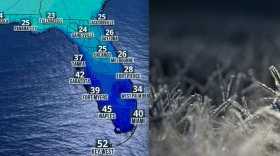LAGUNA WOODS, California – Just before David Wenwei Chou glued and chained shut the doors of California's Geneva Presbyterian Church, then shot the elderly congregants inside, he mailed his handwritten diaries to a Taiwanese newspaper.
He titled his screed: "Diary of an Angel of Destroying Independence" — referring to Taiwanese independence from China.
The rampage this past May left one person dead and five injured. It also exposed how complex Taiwanese and Chinese identities are — and how a combustible mixture of political enmities imported by diaspora communities combined with American gun culture can prove deadly.
At first, English-language coverage mistakenly described Chou, the shooter, as a Chinese immigrant. In fact, he was born in Taiwan to Chinese parents who left China following the end of a brutal civil war in 1949 — a group of people in Taiwan called waishengren, meaning "outside province people." Many waishengren were part of a mass exodus of Kuomingtang officials and their families, the political party that lost to the Communist Party that now governs from Beijing.
The Kuomingtang Party expected and wanted Taiwan to one day become one country with China. For many waishengren, being affiliated with the then-ruling Kuomingtang also conferred privileges indigenous Taiwanese residents did not enjoy, but those privileges dwindled as Taiwan became its own democracy.
"So [waishengren] say wait a minute, we have these privileges before, but how come we don't have them now? They start to think of themselves of Chinese, and that's why they come out with the idea to come out and kill the Taiwanese," says Tony Lee, a Taiwanese-American activist in Los Angeles.
Even in California, waishengren immigrants and benshengren, or "native province people" Taiwanese, keep to each other. For example, the church that Chou targeted was known for its wealthy, pro-Taiwanese benshengren congregation.
Chou emigrated from Taiwan to the United States at the age of 1, and at first, he seemed to settle in to U.S. life. He earned a Taiwanese degree in hospitality management and wrote a book on wine. But then, as his life and finances unraveled after a divorce, he began ranting to acquaintances about how much he resented Taiwan's de facto independence.
"He was very agitated," says Jenny Koo. "Every time he brought up Taiwan independence he got very worked up. I just thought it was not right."
Koo heads a Las Vegas branch of the Peace and Reunification Society, which works for Taiwan's unification with China. The group is closely affiliated with the Chinese Communist Party in Beijing.
Chou, the shooter, tried to join in 2019, and pictures from a meal celebrating the society's founding show him dressed in a loose button-down shirt toasting Koo and others.
I want to convey my sincere condolences on the death of Dr. John Cheng & my hopes for a prompt recovery for those injured in the shooting at the Irvine Taiwanese Presbyterian Church in California. Violence is never the answer.
— 蔡英文 Tsai Ing-wen (@iingwen) May 17, 2022
Koo said she didn't let him join, and he had showed up to the meal without being invited: "Our association writes essays, but we respect the other side's opinions. They are not monsters. But Chou demonized them. You could tell from the language he used that he no longer saw people from Taiwan as people."
For some, immigrating to the United States can be a fresh start: a chance to wipe the slate clean of Old World grudges to live simply as an American. For Chou, emigrating from Taiwan seemed only to amplify historical divisions — a phenomenon Taiwanese writer Leona Chen calls "the immigrant time capsule."
"The very salient political conflicts and tensions experienced during martial law were sort of incubated and carried over by our parents and grandparents' generation," says Chen. "Then they just continued to stay that way even as Taiwan has evolved and changed and softened some of those divisions."
Chou, the shooter, is in police custody and has been charged with one count of capital murder and five counts of attempted murder. Dr. John Cheng, who died in the church attack, is remembered as a hero for charging Chou and helping subdue him long enough for the police to arrive.
So far, there's no indication of imminent war between China and Taiwan, but the casualties of this conflict are already cropping up.
Copyright 2022 NPR. To see more, visit https://www.npr.org.








